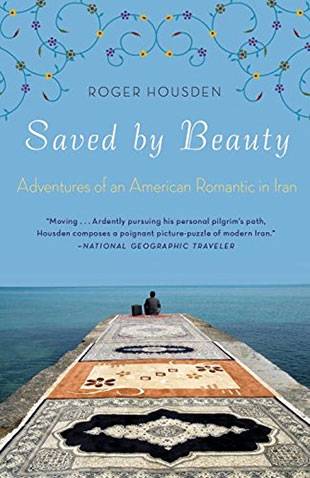Roger Housden, the author more than 20 books, is profiled at Spirituality & Practice as a Living Spiritual Teacher. In June of 2009, he is swept away by romantic images of Iran floating in his head from his youthful days — the poetry, the music, the Sufis, the soaring domes, and the creative artists who have provided soul to a country in turmoil. As he prepares to leave Marin County, California, for Iran, which former President George Bush labeled part of the "Axis of Evil," Housden's sole companion is the Sufi seer and poet Rumi.
In Teheran, a city bursting with ten million people, the inquisitive author talks to a filmmaker, a video artist, the founder of one of the most popular art and culture websites in Iran, a passionate larger-than-life female artist, and others. Seventy percent of people in this country are under thirty which explains their fascination with plastic surgery, an Elvis craze, and the adulation of creative individuals of all types.
Housden moves on to visit Hafez's tomb and notes the custom in every household to pick a couplet by this beloved poet from a bowl of cards on the shortest day of the year. The author sees him as "a universal mystic" more than a Sufi or a Muslim.
Our word "paradise" comes from the Iranian word for garden. Housden is enchanted by the beauty of these blossoming realms and intrigued by carpets with garden motifs in hotels and on sale everywhere. He also writes about the first declaration of human rights made by Cyrus the Great 2,500 years ago, the situation of Jews in Iran (more are here than in any other Muslim nation), and the dualism of Zoroastrianism started in Iran 3,500 years ago and still practiced.
Housden calls Isfahan "the Florence of the Orient" and spends time in the Royal Mosque pondering the beauty of God and the creation. He is interested in the resiliency and beauty of character espoused by Sufis. They represent the mystical dimension of Islam and follow a devotional path of silence, prayer, chanting, and ecstatic dance. In Kurdistan, Housden meets with a sheikh and his community who offer an alterative to the zeal of Muslim fundamentalists in Iran.
Back in Tehran for Christmas, the traveler reflects on the integration of spiritual matters into the arts in Iran; this is not happening in the United States except for the films produced for the large Christian fundamentalist market. Housden laments the often violent and repressive treatment of women in a country where a man cannot sit on a bus in the seat a woman has vacated because her lingering body heat may arouse him sexually. On the last leg of his journey he experiences the best birthday party ever, a Sufi healing service, and a profoundly meditative time at another mosque. At the airport Housden is detained and given a scary, humiliating, and daunting introduction to the repressive, paranoid, and terrifying measures taken by the Iranian security forces to protect their country from imagined enemies.
